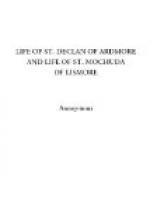The present text is a reproduction of the Brussels Ms. plus lengthening of contractions. As regards lengthening in question it is to be noted that the well known contraction for “ea” or “e” has been uniformly transliterated “e.” Otherwise orthography of the Ms. has been scrupulously followed—even where inconsistent or incorrect. For the division into paragraphs the editor is not responsible; he has merely followed the division originated, or adopted, by the scribe. The Life herewith presented was copied in 1629 by Brother Michael O’Clery of the Four Masters’ staff from an older Ms. of Eochy O’Heffernan’s dated 1582. The Ms. of O’Heffernan is referred to by our scribe as “seinleabar,” but his reference is rather to the contents than to the copy. Apparently O’Clery did more than transcribe; he re-edited, as was his wont, into the literary Irish of his day. A page of the Brussels Ms., reproduced in facsimile as a frontispiece to the present volume, will give the student a good idea of O’Clery’s script and style.
Occasional notes on Declan in the martyrologies and elsewhere give some further information about our saint. Unfortunately however the alleged facts are not always capable of reconciliation with statements of our “Life,” and again the existence of a second, otherwise unknown, Declan is suggested. The introduction of rye is attributed to him in the Calendar of Oengus, as introduction of wheat is credited to St. Finan Camm, and introduction of bees to St. Modomnoc,—“It was the full of his shoe that Declan brought, the full of his shoe likewise Finan, but the full of his bell Modomnoc” (Cal. Oeng., April 7th). More puzzling is the note in the same Calendar which makes Declan a foster son of Mogue of Ferns! This entry illustrates the way in which errors originate. A former scribe inadvertently copied in, after Declan’s name, portion of the entry immediately following which relates to Colman Hua Liathain. Successive scribes re-copied the error without discovering it and so it became stereotyped.
III.—ST. MOCHUDA.
“It was he (Mochuda) that had the famous congregation consisting of seven hundred and ten persons; an angel used to address every third man of them.” (Martyrology of Donegal).
In some respects the Life of Mochuda here presented is in sharp contrast to the corresponding Life of Declan. The former document is in all essentials a very sober historical narrative—accurate wherever we can test it, credible and harmonious on the whole. Philologically, to be sure, it is of little value,—certainly a much less valuable Life than Declan’s; historically, however (and question of the pre-Patrician mission apart) it is immensely the more important document. On one point do we feel inclined to quarrel with its author, scil.: that he has not given us more specifically the motives underlying Mochuda’s expulsion from




